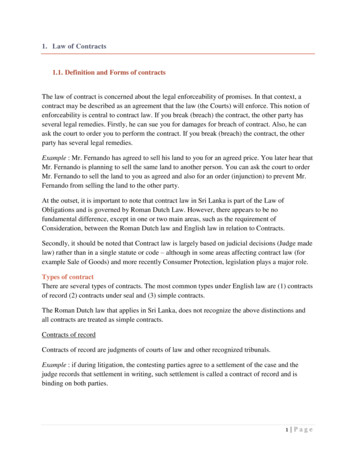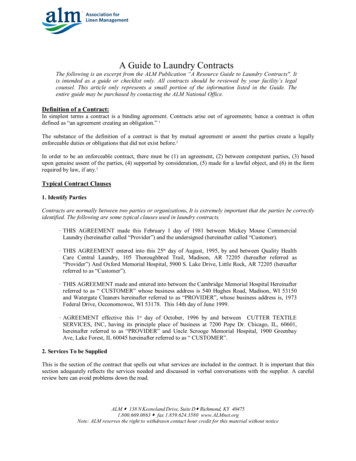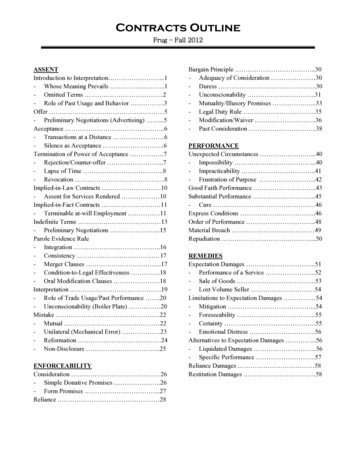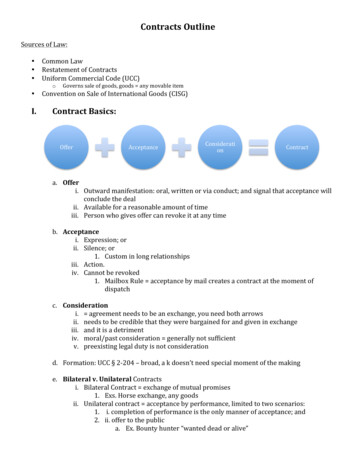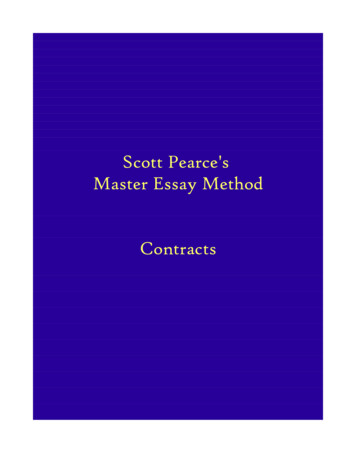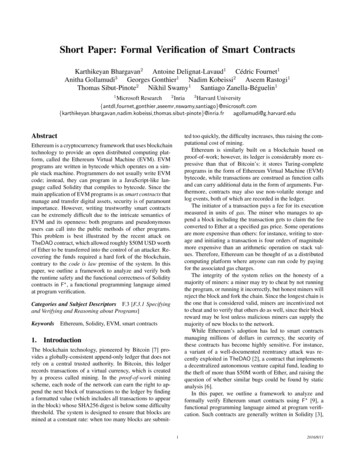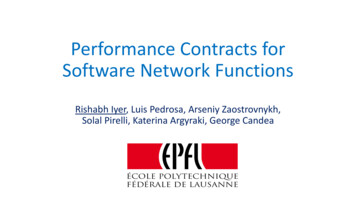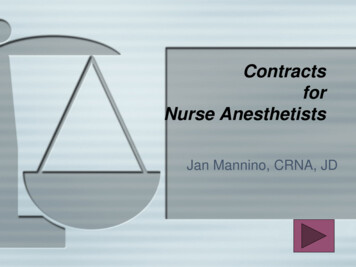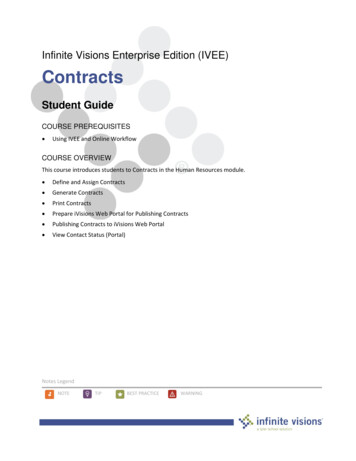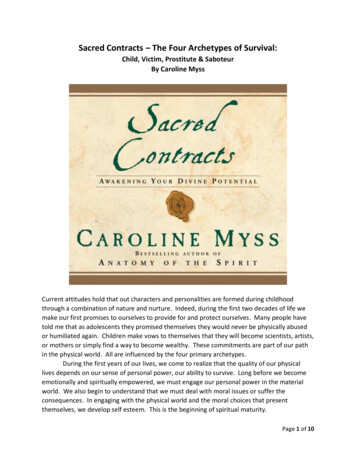
Transcription
Sacred Contracts – The Four Archetypes of Survival:Child, Victim, Prostitute & SaboteurBy Caroline MyssCurrent attitudes hold that out characters and personalities are formed during childhoodthrough a combination of nature and nurture. Indeed, during the first two decades of life wemake our first promises to ourselves to provide for and protect ourselves. Many people havetold me that as adolescents they promised themselves they would never be physically abusedor humiliated again. Children make vows to themselves that they will become scientists, artists,or mothers or simply find a way to become wealthy. These commitments are part of our pathin the physical world. All are influenced by the four primary archetypes.During the first years of our lives, we come to realize that the quality of our physicallives depends on our sense of personal power, our ability to survive. Long before we becomeemotionally and spiritually empowered, we must engage our personal power in the materialworld. We also begin to understand that we must deal with moral issues or suffer theconsequences. In engaging with the physical world and the moral choices that presentthemselves, we develop self esteem. This is the beginning of spiritual maturity.Page 1 of 10
The four primary archetypes – the Child, Victim, Prostitute and Saboteur – symbolizeour major life challenges and how we choose to survive. Together they represent the issues,fears, and vulnerabilities that cause us to negotiate away of our spirits within the physicalworld. They also can come to represent spiritual strengths for dealing with real-life andspiritual issues. These four archetypes are like the four legs of a table on which our SacredContract rests. The table leg represents our relationship to the ground beneath our feet and tothe universal energy that supports our life. They might by straight or curved or embellishedwith carvings and images, depending on how these four archetypes work within our psychesduring the course of our lives. But they need to be stable to support the weight of the tabletop- our life and mission.All four archetypes influence how we relate to material power, how we respond toauthority, and how we make choices. These archetypal energies are neutral and I mustreinforce that point here because of the connotations of their names. Although it can bedifficult to see how the Victim, Prostitute, and Saboteur can provide us with powerful andsupportive imagery, they do and you will. You’ll come to see how even the most commonvariant of the Child archetype, the Wounded Child, can help you deal with your life today.These four archetypes are the intimate companions of your intuition. They make youconscious and your vulnerabilities, your fear of being victimized. They allow you to see howyou sabotage your creative opportunities or abort your dreams, and in the future they willbecome your allies in fulfilling opportunities and dreams. Your archetypes will become yourguardians and will preserve your integrity, refusing to allow you to negotiate it away under anycircumstances. Your archetypes can help you transcend the shadow belief that “everyone has aprice” and allow you to see that you are not for sale. They will allow you to become completelyself-reliant; through them you will come to see options where others see excuses.The richest reward in working with these survival archetypes, however, reveals itself inthe manner in which your Contract unfolds. While it is a given that you have Contracts to meetcertain people, it is not determined ahead of time what kind of interaction you will have witheach of them. That is up to you and, of course, to them. You can choose how you interact, butthe more conscious you are about the patterns that influence your behavior, the more likely itis that your choices - and the lessons you get from them – will be positive. If your choices areformed only by your unconscious, however, and you are unaware of the archetypal energiesinfluencing you, you will more likely act out of insecurity and defensiveness. By remainingaware of the archetypal energies, you stay conscious of both your divinity and your potentialand the everyday world. Through your archetypes, you will find the Middle Way, the path ofyour Sacred Contract.The Child: Guardian of InnocenceThe Child archetype is our beginning point. We most easily identify with the Child,especially after several decades of popular books and workshops on the inner Child. Thisarchetype establishes our perceptions of life, safety, nurturing, loyalty, and family. Its manyPage 2 of 10
aspects include the Wounded Child, the Innocent Child, the Nature Child and the Divine Child.These energies may emerge in response to different situations in which we find ourselves, yetthe core issue of all the Child archetypes is dependency and responsibility: when to takeresponsibility, when to have a healthy dependency, when to stand up to the group, and whento embrace communal life. The stages of growing up, from coming to the age of reason atabout seven, to entering adolescence at around thirteen, to reaching the official age ofadulthood at twenty-one, represent plateaus of spiritual and physical maturation. When weare completely dependent, from birth to age seven, we develop the first skills for taking care ofourselves, our bodies, and our possessions. At age seven, we begin learning what it means tobe responsible not just for our belongings but for our actions and deeds as well. Through agesseven to thirteen we develop further emotionally, as we are introduced to larger issues ofmorality, ethics, loyalty, and the rules of relationships.During adolescence we become self-aware, self-conscious, and self-centered. Webecome aware of – it not consumed with – the power of our mind, the pull of our heart, andthe passion of our body. During the wild year’s images of all that you could be or all that youfear you will never become also step to the fore. During the late teens and early twenties, youdiscover your vulnerabilities as an adult along with your strengths and talents. You makesubstantial choices about your life, and even though you will doubtless change your mind manytimes, or circumstances will reroute you, this is the beginning of your real contact with theworld of physical responsibility separate from your tribe. Finally, the power of the spiritemerges around the age of twenty-one, as you begin to see beyond the physical aspect of lifeto find symbolic meaning in your actions, from political activism and social idealism to love andspiritual exploration. Around age twenty-eight you naturally transition into the next cycle ofyour life as interconnected, responsible adult.The process that I have just described is, of course, how we ideally mature. Because ofthe complex challenges of everyday life, however, this spiritual maturation varies for mostpeople. From an archetypal point of view, when these cycles are not followed in some way,adults will find it difficult if not impossible to be responsible for themselves in the physicalworld and to create successful relationships. Your inner Child will exhibit aspects of theWounded or Orphan Child and will reflect that, somewhere along the line, you did not receivethe nurturing necessary for you to become responsible and independent. And so you may wellspend the early years of adulthood trying to heal and compensate for these deficiencies.Confronting the Child archetype within you awakens a new relationship with life, a freshbeginning. Regardless of which aspect of the Child you relate to most intimately, thisarchetypal pattern brings you into contact with the untapped resources connected to creativethought. This is the core of the Innocent Child – the sensation anything and everything ispossible.As the guardian of your innocence, the Child helps heal, repair, and put a stop to theinner-directed abuse of the Wounded Child. If you are consumed with the Wounded,Neglected, Abandoned, or Orphan Child’s psyche, you need to identify – or initiate – a newrelationship or creative enterprise that makes you appreciate your life. Ask your Child what itPage 3 of 10
needs in order to heal or feel nurtured or cared for. The Child often inspires you to act outsiderestrictive boundaries or to explore an adventure without the burdensome weights of the adultmind. Indulge some of these inspirations as a means of making contact with your inner Child.Don’t become over attached to the wound, however; don’t over indulge the Child so that itbecomes an inner brat. But give it the support it needs to grow up.The Victim: Guardian of Self-EsteemBeing a victim is a common fear. The Victim may manifest the first time you don’t getwhat you want or need; are abused by a parent, playmate, sibling, or teacher; or are accused ofor punished for something you didn’t do. You may suppress your outrage at the injustice if thevictimizer is bigger and more powerful than you. But at a certain point you discover a perverseadvantage to being the Victim. You may be afraid to stand up for yourself, or you may enjoygetting sympathy. The core issue of the Victim is whether it’s worth giving up your own senseof empowerment to avoid taking responsibility for your independence.The lessons associated with the Victim archetype demand that you evaluate yourrelationship to power, particularly in your interactions with people with whom you have controlissues and need to construct personal boundaries.The primary objective of the Victim archetype is to develop self-esteem and personalpower. When you are in a situation in which you feel threatened or you suspect that you lackthe appropriate social, professional or personal power, take notice of that reaction physically,emotionally and mentally. That is the intuitive voice if your inner Victim. To help direct yourresponses to all of your experiences and relationships, say “I am committed to my ownempowerment. What choice can I make here that will serve my own empowerment?” Namethe problem or threat you need to overcome and the power that you need to posses in order todo so. Keep your eye on the truth that everything and everyone in your life is there by Contractto assist in your spiritual maturation.You have Contracts with people who are directly connected to the Victim archetype.Their primary role is to help you develop your self-esteem through acts of honesty, integrity,courage, endurance, and self-respect. Those people whose Contracts are linked to empoweringyour Victim will play, or have played, the leading roles in awakening in you an awareness of thevalue of these spiritual qualities and how essential they are to your well-being.The Prostitute: Guardian of FaithThe act of prostitution is generally associated with selling one’s body for money, but tomy mind that perhaps the least significant example if the Prostitute archetype. The Prostitutethrives most bountifully in subtle ways and in ordinary, everyday circumstances. It comes intoplay most clearly when our survival is threatened. Its core issue is how much you are willing tosell of yourself – your morals, your integrity, your intellect, your word, your body, or your soul –for the sake of physical security. The Prostitute archetype also dramatically embodies and teststhe power of faith. If you have faith, no one can buy you. You know that you can take care ofPage 4 of 10
yourself and also that the Divine is looking out for you. Without faith, however, you willeventually meet the price you cannot turn down.The majority of Prostitutes that I have met and continue to meet are men and womenwho are either in bad marriages or in miserable jobs. Their inability to move out of their toxicenvironments is totally tied to economics. Women have told me that they do not want to bemiddle-aged and single, or lose their social status, or have to support themselves, and so theystay in unhappy marriages. Men tell me this too, but not nearly as often, and both men andwomen say that they remain in jobs that make them miserable or sick, violate their ethics, ormake them feel bad about themselves for the sake of financial security.Many people tell me how unhappy they are and that they are waiting for just the rightmoment in their lives to make the “big break” and follow their dreams. Most often, these arethe people who ask again and again, “But what exactly is my Contract? If I only knew, I couldget on with it.” These people are actually hoping that I can direct them on a path that willguarantee them money and peace of mind. They want to hear that their Contract will givethem all the time in the world, all the money they need while doing only what they want, acabin retreat in the woods, and last but not least a soulmate. They also never want to age.(The energies and expectations of Prostitute, Child, and Victim all have to be addressed!)All power, whether from lottery winnings or spiritual visions, will draw to you someoutside opponent who will try to buy, use, or contaminate you. When Jesus was met by Satanas he prayed and fasted in the desert, Satan offered to give him the entire physical world inexchange for the power Jesus now had within him. Likewise, every time you take one step onyour path of personal empowerment, you will meet someone who will want to buy a piece ofyour soul to render you less powerful and themselves more powerful.A shadow characteristic of the human psyche in general is that we want to find theshortcuts in life, including shortcuts to our own empowerment. If we spot someone whosepower appears as if it could be bought or shared, we will be attracted to it. A perfect exampleis the game of “name wealth” (I am a friend of a friend of Mr. and Ms. Famous”). The dilutedenergy that comes down this path of who’s who is, for many, valuable enough for them toremain in a relationship long past the time the friendship has grown cold – another expressionof the Prostitute archetype.Confronting the Prostitute within you transforms thi
By Caroline Myss Current attitudes hold that out characters and personalities are formed during childhood through a combination of nature and nurture. Indeed, during the first two decades of life we make our first promises to ourselves to provide for and protect ourselves. Many people have told me that as adolescents they promised themselves they would never be physically abused or humiliated .
